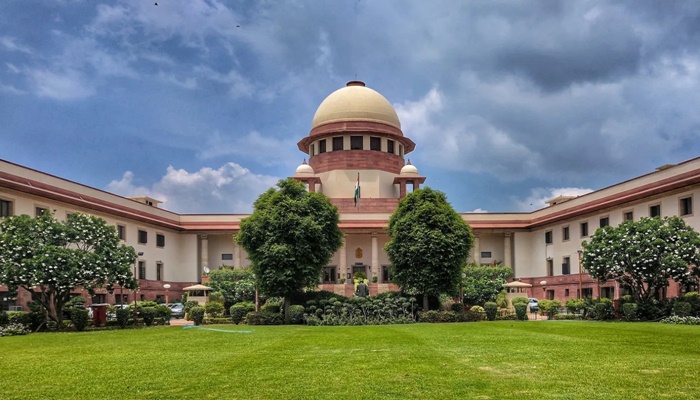The Supreme Court held that the employee’s right to receive the report is a part of the reasonable opportunity of defending himself/herself in the first stage of the enquiry.
The Court held thus in a Civil Appeal filed by the Uttar Pradesh State against the Judgment of the Allahabad High Court which dismissed its Writ Petition challenging the Uttar Pradesh State Public Services Tribunal’s Order.
The two-Judge Bench comprising Justice Dipankar Datta and Justice Prashant Kumar Mishra observed, “The first stage ends when the disciplinary authority arrives at its conclusions on the basis of the evidence, enquiry officer’s report and the delinquent employee’s reply to it with regard to his alleged guilt. The second stage begins when the disciplinary authority decides to impose penalty on the basis of its conclusions reached at the first stage. If the disciplinary authority decides to drop the disciplinary proceedings, the second stage is not even reached. The employee’s right to receive the report is, thus, a part of the reasonable opportunity of defending himself in the first stage of the enquiry. If this right is denied to him, he is in effect denied the right to defend himself and to prove his innocence in the disciplinary proceedings.”
The Bench was of the view that the requirement of furnishing the report of enquiry, though procedural, is of a mandatory character and the bogey argument of the employer to apply the test of ‘prejudice’ when the report of enquiry is not furnished cannot be of any avail to thwart the challenge of the delinquent employee.
AOR Shaurya Sahay appeared for the Appellant/State while AOR Anil Kumar Mishra appeared for the Respondent/Employee.
Factual Background
The Respondent was serving as an Assistant Engineer in District Panchayat in 2004-2005. According to the Appellant, the Respondent had engaged in embezzlement of Panchayat funds to the tune of Rs. 2.5 Crores in relation to certain drainage and road construction projects. In cahoots with the incumbent Junior Engineer, the Respondent had created sham work records and siphoned off panchayat funds. Consequently, the Commissioner, Gorakhpur Division was appointed to make a preliminary enquiry. He directed the Technical Audit Cell and Divisional Technical Examiner to determine the existence and extent of financial irregularities committed by the Respondent. The Technical Audit Cell submitted the financial audit report, which found the Respondent to have verified fake records of work created by the Junior Engineer.
In 2006, the Respondent was placed under suspension in contemplation of disciplinary proceedings. He was served with a chargesheet and the audit reports constituted the basis for the charges. This was challenged before the High Court which result in his reinstatement in service. The Respondent reached the age of superannuation in 2010 and almost after two and half years of submission of the enquiry report, he received an order dismissing him from service. Apart from that, a penalty of Rs. 10.52 lakhs was imposed on him. He challenged this order before the Tribunal which allowed his claim and set aside the impugned Order. Therefore, the Appellant approached the Apex Court.
Reasoning
The Supreme Court in view of the facts and circumstances of the case, noted, “… the right to receive the enquiry report as a fundamental safeguard in disciplinary proceedings, where such report holds the charges against the delinquent employee to be established, was firmly entrenched by the Constitution Bench in the jurisprudence relating to proceedings initiated for disciplinary action for misconduct. This valuable right applies uniformly, regardless of who the employer is (Government, public or private) and regardless of what the rules governing the service ordain.”
The Court added that even if the Rules are silent or do not require furnishing of the enquiry report, the same has to be furnished and the report must be furnished to the employee even without a request, as it forms an integral part of ensuring a fair and reasonable opportunity to defend against the charges.
“By not furnishing the report, an employer cannot scuttle the rights of the delinquent employee”, it further remarked.
The Court emphasised that the right to receive the report of enquiry being available prior to a final decision being taken in the disciplinary proceedings cannot be postponed by any arbitrary act of the employer in not following the law, which can be or should be validated by the Court, and what was intended to be a pre-decisional opportunity cannot be made to partake the character of a post-decisional opportunity.
“… lack of access to the report would severely hamper the ability of the employee to demonstrate ‘prejudice’ and to build a strong case for succeeding in his challenge to the order of punishment. Besides, the lengthy legal process could be agonizing, and especially without any earning, may not only lead to financial strain and diminished resolve but could eventually end up with the employee abandoning the challenge”, it also said.
Court’s Important Remarks
Furthermore, the Court remarked that employers take advantage and employ methods to drag on proceedings for years and thereby ensure that through the process of ‘wear and tear’, the employee (if he has been either dismissed or removed from service) loses steam and, inevitably, lacking interest in the challenge effectively gets thrown out of the legal arena by forces beyond his control.
“In a battle between the mighty lion and the weak lamb when the former is in an overpowering position, should the courts lean in its favour and put the weak to the sword for not having demonstrated ‘prejudice’ when a brazen violation of the law declared by the Constitution Bench is brought to its notice? Why should the mighty not be made answerable as to why the report of enquiry has not been furnished and to bear whatever consequences that are bound to follow its failure, omission or neglect in this behalf?”, it added.
The Court observed that allowing employers to circumvent the law declared by the Constitution Bench and dilution of such declared law regarding the necessity, nay imperative, to furnish the enquiry report by interpretative exercises subsequently undertaken by Benches of lesser strength without bearing in mind other Constitution Bench decisions on the effect of breach of natural justice principles and the consequences that could visit an employee whose service is terminated if the report were not furnished in the first place is an unfortunate development which undermines the rule of law.
“In case the tribunal/court is satisfied that real effort was made by the employer but such effort remained abortive because the report could not be furnished to the employee for reason(s) beyond its control, or some other justification is placed on record, which is acceptable to the tribunal/court, the test of ‘prejudice’ is open to be applied but only after ensuring service of a copy of the enquiry report on the employee. In a case where the employee either expressly or by his conduct appears to have waived the requirement of having access to the report, it would be open to the tribunal/court to deal with the situation as per its discretion”, it said.
Moreover, the Court elucidated that no proof of prejudice for breach of a statutory rule or the principles of natural justice and fair play need be proved, unless there is a waiver, either express or by conduct, to of the right to receive the report and, it is only in specific and not in all circumstances that proof of ‘prejudice’ ought to be insisted upon.
Conclusion
The Court was of the view that proceeding despite objection and without there being an extension could give rise to apprehensions of bias and, therefore, applying for extension upon halting the proceedings awaiting order on the application would be an advisable course of action to balance the interests of both the employer and the employee.
“… even if the delinquent employee has not objected to continuation of proceedings beyond the time stipulated by the tribunal/court but before the final order is passed in the proceedings, the disciplinary authority would be bound to seek and obtain extension of time”, it further noted.
The Court held that continuation of disciplinary proceedings beyond the time stipulated by a Tribunal/Court could invite interdiction if no bona fide attempt is shown to have been made to seek an extension of time, however, much would depend on the facts of each case and it may not be possible to lay down a common formula applicable to each case.
“In an exceptional case, the tribunal/court would have the discretion to overlook the laxity and make such direction as it deems fit in the circumstances. … Without an extension of time, no order of punishment could have been validly made and the grievance of the respondent in this behalf is absolutely legitimate”, it observed.
The Court remarked that it is clear as day-light that the Appellant despite being given an opportunity to proceed in accordance with law, failed to utilise such opportunity and the Respondent has experienced 75 (seventy-five) summers, and is now in the winter years of his life.
“Respondent, undoubtedly, was denied a reasonable opportunity to defend himself in the enquiry by the appellant, as ordained by the 1999 Rules. The manner in which the disciplinary proceedings were conducted and continued against the respondent did not satisfy the requirements of ‘due process’.”, it concluded.
Accordingly, the Apex Court dismissed the Appeal and upheld the impugned Order.
Cause Title- State of Uttar Pradesh v. Ram Prakash Singh (Neutral Citation: 2025 INSC 555)




















